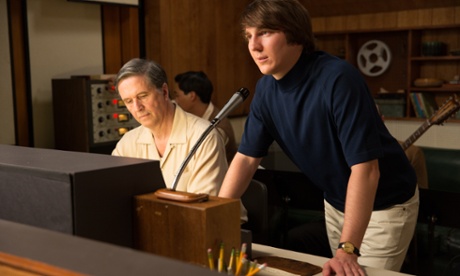
This very absorbing, heartfelt movie about the Beach Boys’ Brian Wilson is written by Oren Moverman and Michael A Lerner and directed by Bill Pohlad; it’s creative and experimental in just the right spirit, though with an asymmetric flaw. The film is a kind of diptych in which one of the panels is more fully achieved than the other.
Love & Mercy takes its title from the opening track from Wilson’s 1988 solo album and it’s about two commodities in very short supply. We are presented with an oblique and elliptical study of this unhappy musical pioneer, infuriated by the thought of being out-evolved by the Beatles and driven to create a brilliantly pioneering album, Pet Sounds, about which there was incidentally nothing domesticated whatever.
His vocation is shown to have a terrible cost. Wilson is already suffering psychiatric disorders and anxiety attacks; he is tormented with guilt at having dismissed his abusive father as the Beach Boys’ manager, and later some converse Stockholm syndrome instils in him a penitent, compensatory need to submit to the sinister Svengali doctor and dad figure who turns him into a medicated cash cow.
The movie faces off two different Brians, played by two different actors: rather in the way Todd Haynes’s I’m Not There (2007) – co-written by Moverman – had a string of different people to play Bob Dylan. Wilson is portrayed by Paul Dano and John Cusack, past and future Brians of the 60s and 80s, respectively descending into and emerging from mental breakdown either side of the great triumph-cum-disaster of Pet Sounds, that critically adored commercial disaster.
Dano is the puppyishly eager and square-looking younger Brian shown with the rest of the band in a witty Super-8-style sketch of the Beach Boys’ early years over the opening credits. Wilson is then liberated, like so many of his musical generation, by refusing to play live and instead finding solace in the recording studio. He develops bold new orchestrations and arrangements, new sound textures of an analogue era that to the modern taste might sound more like inspired folk or world-music creations. He finds new dimensions to his genius for choral harmony: Brian is his own George Martin, but the band do not support him and loneliness, drug use and mental instability take their toll.
Dano is brilliant as Wilson, a career-best for him: his deceptively blank, bland, open face and disconcertingly quiet speaking voice are put to great use, sympathetically recreating Wilson’s gentleness, persistence and suppressed agony – his moon-like features framed by a pudding-bowl haircut that grew out, not into wild hippyish tresses, but an unflattering mop. A wild man trapped in the body of a male frump. John Cusack plays the later Wilson, an unhappy, zombiefied and sedated man under the thumb of his controlling manager, Dr Eugene Landy, played – perhaps a little by the villain rulebook – by Paul Giamatti.
Wilson comes into a Cadillac dealership one afternoon and falls in love with the woman selling him a car – Melinda Ledbetter, a smart, controlled performance from Elizabeth Banks. This is the woman who is to rescue Wilson.

Cusack is marginally less good as Brian. His tics and mannerisms are typically and recognisably Cusack-ish, though he interestingly portrays a man who has only notionally got his act together, having lost weight and recommenced work, but presenting a waxy, doughy, tormented face to the world. It is all a high-functioning delusion, created by a drug cocktail. This is a picture of someone who has become alienated from his own talent: the creativity and expression have gone, leaving him only with the sadness and the overwork and the oppressive claustrophobia – for which the studio is a horribly potent image: the musician working in airless vacuum while the controllers sit noiselessly behind glass.
The two-actor approach is a shrewd way of conveying the dislocation and disconnection suffered by Wilson and by those who knew and worked with him: many forced out of his life by fate or professional duplicity. But there are moments when I was philistine enough to wonder if the second half couldn’t simply have been played by Dano as well. However, this would have been to rob the movie of some of its flavour and its hum of strangeness and alienation.
Love & Mercy makes me think it would be interesting to see a British movie about Pink Floyd’s lost genius Syd Barrett, maybe on these lines, maybe not. It’s an eloquent tribute to a great American innovator.







